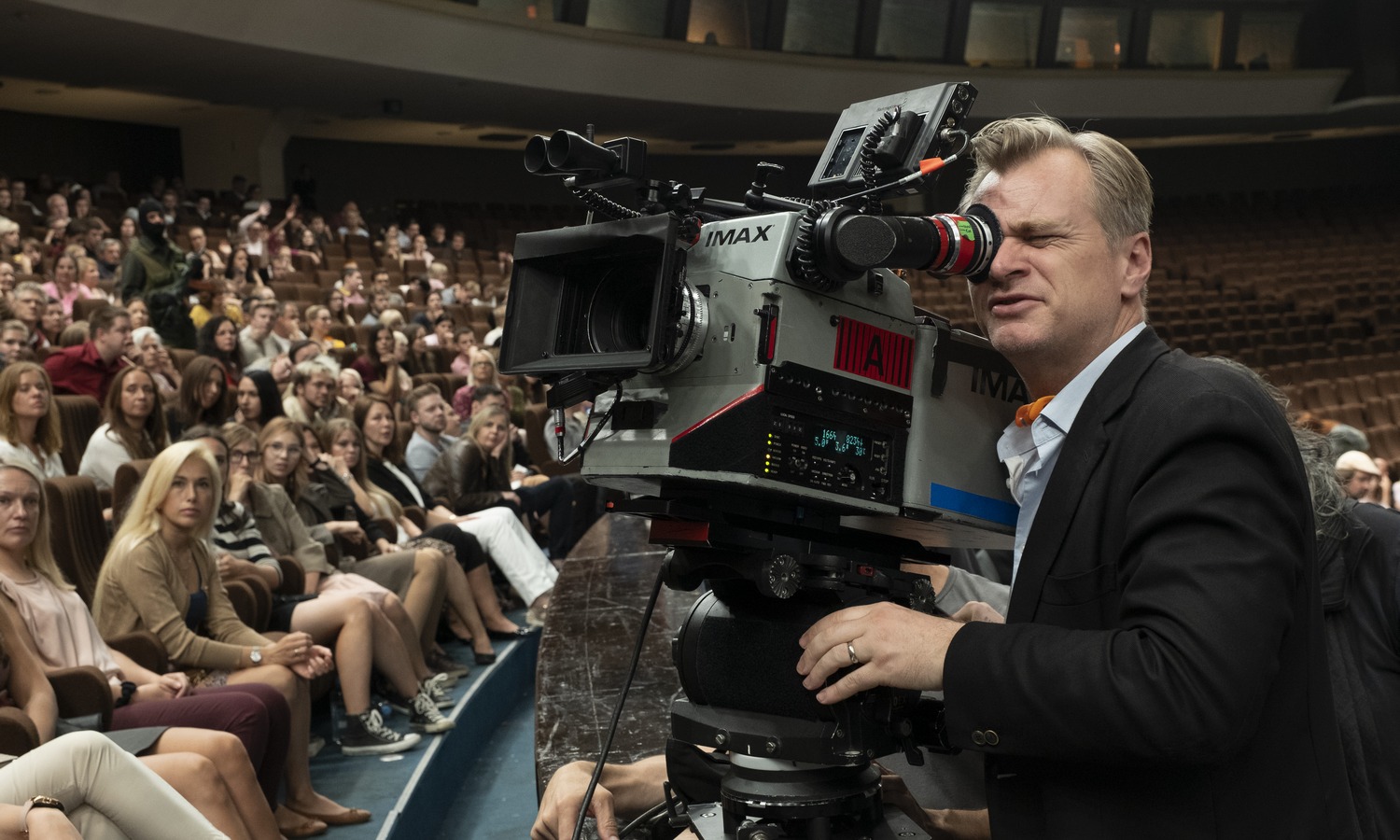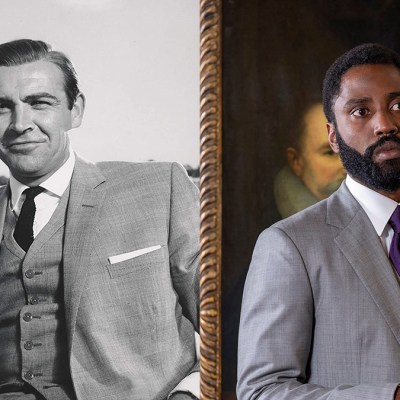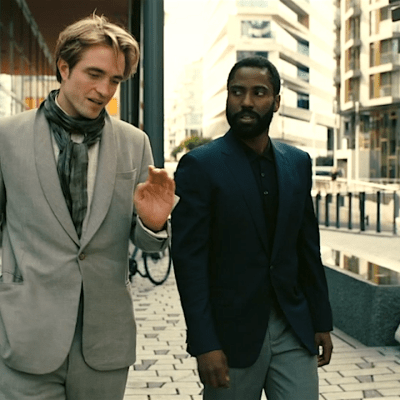Like most things Christopher Nolan does these days, his historic deal with Universal Pictures is big. We’re still learning the finer details of this new business relationship which will give the world Nolan’s next film based on the life J. Robert Oppenheimer, the remorseful father of the atomic bomb, but thanks to The Hollywood Reporter, the biggest elements are coming into focus.
In addition to securing a theatrical release and a $100 million (or so) budget for the “smaller” Nolan picture, the filmmaker behind Inception, Tenet, and The Dark Knight Trilogy also demanded his next studio put up an equally steep $100 million marketing budget for the film, and guarantee that the movie’s 100-day theatrical window (which the trade reports might actually be closer to 130 days) come with a exclusive six-week corridor upon release. In other words, Universal allegedly cannot release any movie three weeks before or after the Oppenheimer film’s opening.
There’s much to be said about the scope of this deal, but perhaps the most surprising thing is it happened at all. It comes after Nolan publicly went through one of the worst breakups between a director and studio in recent memory, leaving Warner Brothers—which has had a hand in one form or another in every Nolan picture since 2002—following the strained release of Tenet during the height of the pandemic in summer 2020. There was then the even more public revulsion Nolan demonstrated toward last December’s WarnerMedia announcement, which unilaterally moved their entire 2021 film slate to a day-and-date release strategy on HBO Max without even consulting the studio’s filmmakers partners.
“Some of our industry’s biggest filmmakers and most important movie stars went to bed the night before thinking they were working for the greatest movie studio and woke up to find out they were working with the worst streaming service,” Nolan said at the time. Notably, the names of the studios that were reportedly allowed to meet with the filmmaker to discuss the Oppenheimer movie were Universal, Sony Pictures, and Apple Studios. Apparently WB did not meet with Nolan about even the possibility of still distributing the project, which suggests an especially bad break.
Be that as it may, the deal Nolan has inked with Universal is historic in a moment where studios are shrinking theatrical windows by smaller and smaller degrees, and much of the conventional wisdom—at least among the executive class—is that streaming is the future. That certainly seemed to be the undercurrent of the WarnerMedia deal at least as of last year (the media company has since gone through another major corporate shakeup following the merger with Discovery). Indeed, Warner Bros. struck a new deal with AMC Theatres last month guaranteeing their film slate in 2022 will have an exclusive 45-day theatrical window before any potential streaming release.
But that is what makes Nolan’s deal with Universal so surprising: He was able to command a theatrical exclusivity Nolan might have previously enjoyed at Warner Bros., but which is looking increasingly like a relic from a bygone age: a 100-day window. More surprising still, Universal agreed to essentially not release any movie for over a month that isn’t about J. Robert Oppenheimer. Given Universal is one of the few studios who is still courting a healthy library of theatrical releases that aren’t just intellectual property or smaller films being earmarked for streaming, that’s a long corridor to not have any sort of counter-programming to what is presumably going to be an adult-leaning drama.
Anecdotally, I’ve seen some bemoan on social media the audacity of a filmmaker expecting 100 days of theatrical exclusivity. But the irony is this was more or less the normal two years ago. In 2019, the theatrical window for a Hollywood release was 90 days, or three months. It is unknown if Nolan had in his WB contracts that he’d get an extra guaranteed 10 days or more, but 90 days had been the status quo for years—and in the 2000s it was closer to 180 days. Martin Scorsese’s The Irishman never got a wide theatrical release because national theater chains balked when Netflix refused to give the movie more than a 30-40 day exclusive theatrical window (exhibitors were demanding at least 60 days at the time).
The irony is that after the pandemic, Universal was able to pressure AMC Theatres when it was on the verge of bankruptcy to agree to the studio having the ability to keep its movies exclusively in theaters for as little as 17 days. While that deal has yet to actually been enacted, the new normal that’s emerged in 2021 is a 45-day exclusivity window for the cinemas. Or in other words, about half of what the size of what the theatrical window was two years ago, and damn close to Netflix’s Irishman proposal that exhibitors dismissed.
And at least in the last month, this seems to be a temporary boom for everyone since Shang-Chi opened to far larger numbers than most of Disney’s Disney+ Premier Access day-and-date releases, and had a healthy drop in its second weekend unlike Black Widow, which after being put on streaming behind a paywall (but free on piracy sites) cratered at the box office in its second weekend…. Still Disney CEO Bob Chapek has already publicly mused the prospect of Shang-Chi getting a second life as a Disney+ release only 45 days after its Labor Day weekend opening.
Can the Nolan deal push back on this?
It seems likely the enigmatic filmmaker would like it do so. He’s far from alone in his unhappiness with the WarnerMedia/HBO Max deal. Denis Villeneuve, who helmed his dream project Dune at the studio, wrote an op-ed last year venting his dismay at the movie being released on HBO Max the same day it enters theaters. And while he’s personally told Den of Geek he has plans of doing at least two more Dune movies—particularly a second one which finish the adaptation of Frank Herbert’s original 1965 novel—he hasn’t been any kinder to the HBO Max Deal. Last month, he told Total Film that watching Dune for the first time at home is like driving “a speedboat in your bathtub.”
So beyond potential Dune sequels, it’s an open question how happy Villeneuve might remain at Warners. The same might go for any number of filmmakers who were either directly burned in 2021 or fear that a company with such a vested interest in a streaming service might pull a similar stunt again. This could arguably apply doubly so at Disney, which is all-in on cementing Disney+ as Netflix’s biggest competitor, and can get downright vicious when talent demands a cut in streaming surcharge revenues.
So similar to Scarlett Johansson’s lawsuit against the Mouse House due to an alleged breach of her unique contract on Black Widow, which her lawyers contend “promised” an exclusive theatrical window, the question becomes can other filmmakers start making similar demands in their contracts to Nolan.
Honestly, it’s unclear. Nolan remains one of the few working Hollywood directors who can open a blockbuster film to a wide audience based solely on the mystique associated with his name: Inception, Interstellar, and Dunkirk were all challenging adult films which on paper should’ve made studios nervous in the IP and formula-obsessed era of the 2010s. Yet only Tenet has disappointed the filmmaker, and that was released (at Nolan’s insistence) in the pandemic’s pre-vaccination era.
Read more
It is hard to see many filmmakers commanding the same level of clout, especially for the more expensive films. There are the old guard of respected auteurs who seem to have a career-long pass like Steven Spielberg or Quentin Tarantino—the latter of whom was able to net a similarly impressive deal when Sony Pictures agreed to front a $90 million budget for the elegiac adult dramedy, Once Upon a Time… in Hollywood—but many speculate that era of filmmaker clout is fading. Even respected Spielberg and Tarantino contemporaries like Scorsese or David Fincher have transitioned to making films for streaming.
It’s frankly easier to imagine respected auteurs behind the also increasingly rare “medium budget” prestige picture being able to command exclusive theatrical windows in their contracts going forward. But 100 days for $100 million? That might be a dying superpower.


